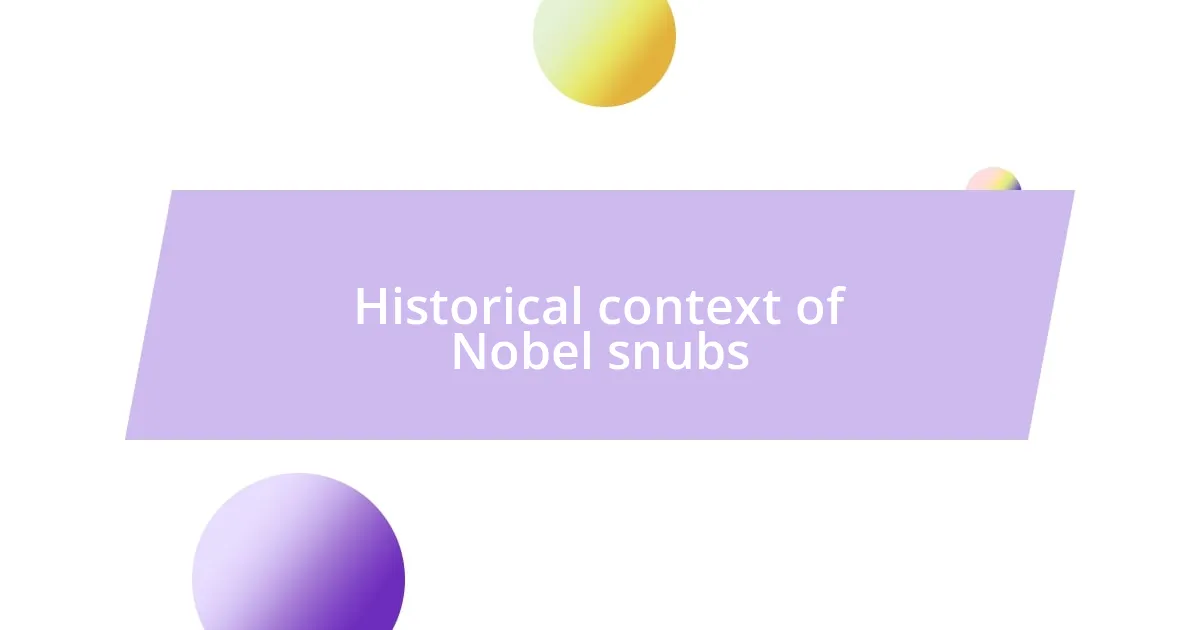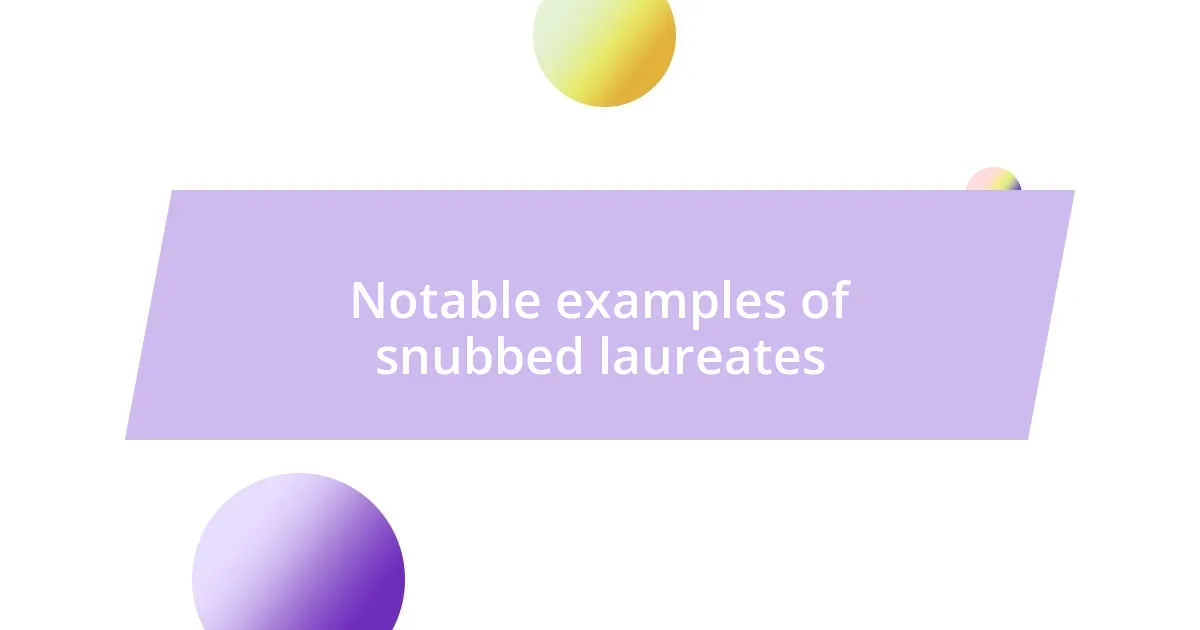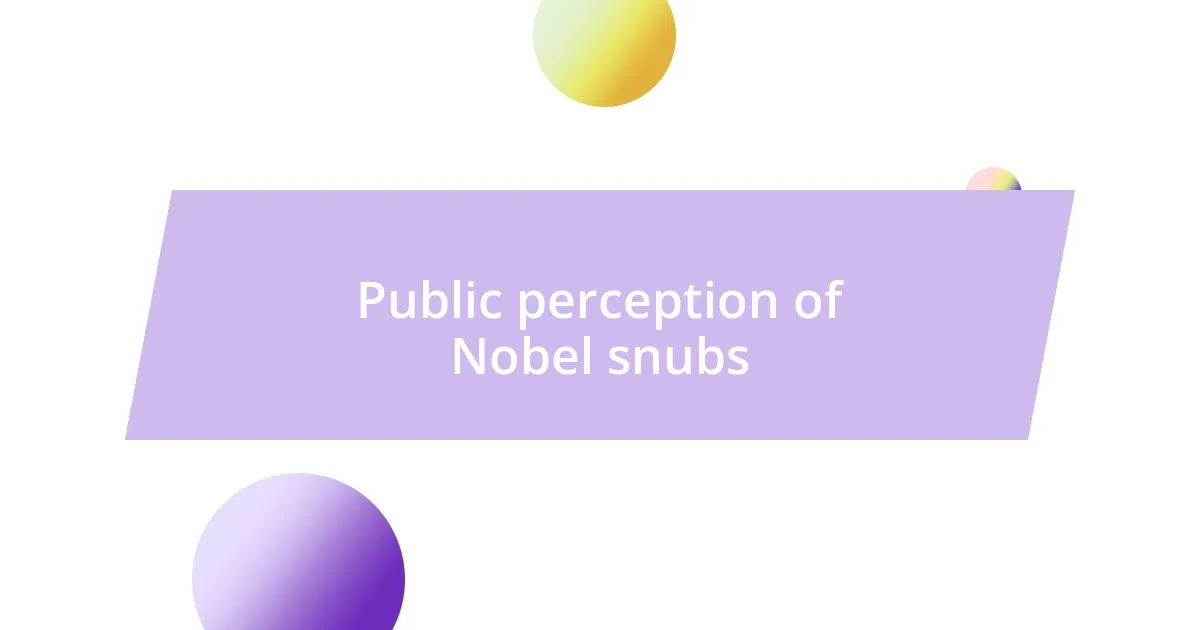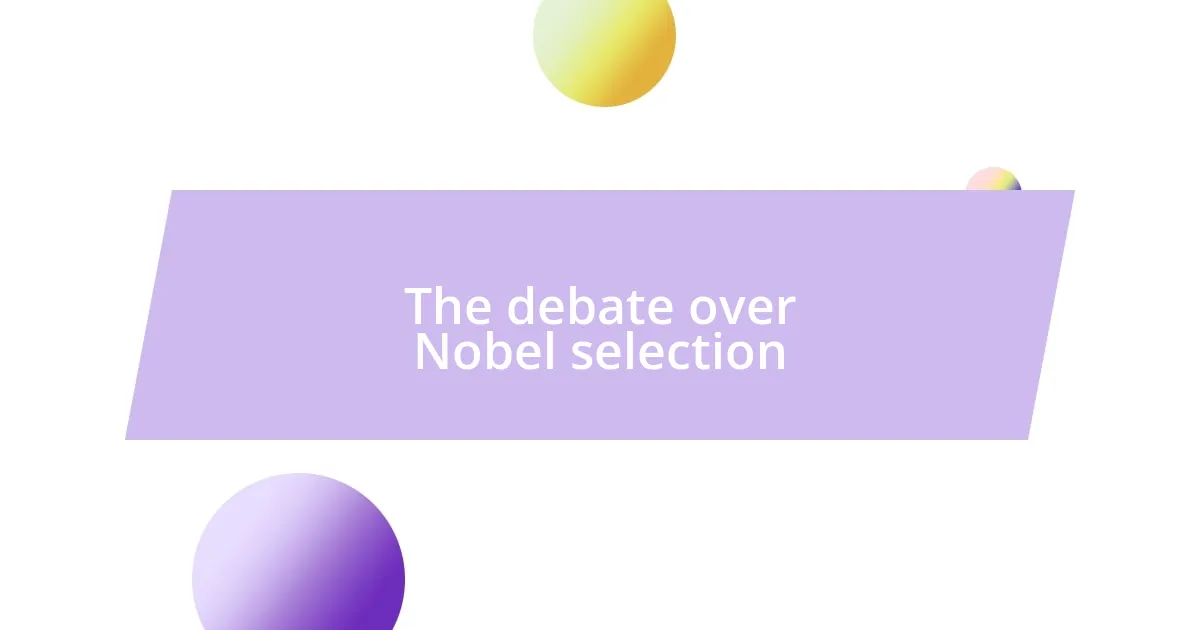Key takeaways:
- The Nobel Prize selection process is perceived as arbitrary, often leading to significant figures being overlooked despite their impactful contributions.
- Historical omissions, including figures like Gandhi and Meitner, raise questions about biases in recognition and the influence of sociopolitical contexts.
- Public outrage over Nobel snubs reflects broader societal values and biases, highlighting a need for a more inclusive approach to acknowledgment and merit.
- Advocating for change involves fostering grassroots movements and amplifying diverse voices, rather than solely relying on prestigious awards for validation.

Understanding Nobel laureate snubs
It’s fascinating how the Nobel Prize, despite its prestige, can sometimes overlook brilliant minds. I remember discussing this with a friend who was particularly upset when a certain author—one whose works resonated deeply with our generation—missed out on the Prize. It left us both scratching our heads, wondering what criteria were being used to measure brilliance.
The selection process is shrouded in mystery, often leading to passionate debates among scholars and the public alike. Personally, I’ve felt that some choices seem arbitrary, almost as if the committee is playing a game of favorites. How do they weigh contributions against the backdrop of societal impact? It’s a question that seems to float around each awards season.
Moreover, these snubs can have real consequences for the individual’s career and acknowledgment in the field. I once met a scientist who had devoted decades to groundbreaking research yet received little recognition until much later in life. It made me realize how important such accolades can be not just for prestige but also for funding and future opportunities. How many innovations have gone unnoticed because the luminaries behind them didn’t receive their deserved spotlight?

Historical context of Nobel snubs
The history of Nobel snubs is as intriguing as the awards themselves. For instance, I recall a debate where we discussed the omission of certain authors like James Joyce or Virginia Woolf. Each time their names came up, I felt a surge of frustration; their contributions to literature are monumental, yet the Nobel Committee seemed unaware of their brilliance, which sparked my curiosity about the unpredictable nature of selection criteria.
Interestingly, some of the most significant figures in history, such as Mahatma Gandhi and Leo Tolstoy, never received the Nobel Prize despite their profound impact on society. I often contemplate what it says about our values when such catalytic leaders are overlooked. Could it be that the committee’s focus shifts according to the sociopolitical climate? It certainly makes me reflect on how external factors could influence recognition in ways we don’t immediately see.
Furthermore, even in science, the neglect of key researchers like Lise Meitner, who contributed immensely to nuclear physics, is hard to comprehend. Her omission made me question not just the fairness of the awards, but also the historical bias that often overlooks women in science. Reflecting on these stories, I realize that each snub tells a larger tale about recognition, legacy, and what we choose to celebrate.
| Nobel Snub | Details |
|---|---|
| James Joyce | Omitted despite revolutionary prose style |
| Mahatma Gandhi | Never awarded for promoting nonviolent resistance |
| Lise Meitner | Ignored for contributions to nuclear physics |

Notable examples of snubbed laureates
The issue of overlooked laureates often strikes a personal chord with me, especially when I reflect on the brilliant minds that have slipped through the cracks. Take Albert Einstein, for example; while he did receive the Nobel Prize in Physics for the photoelectric effect, many argue that his groundbreaking work in relativity was far more transformative. I remember discussing this with a group of my peers, where the consensus seemed to acknowledge that his revolutionary ideas deserved wider recognition. This sentiment lingers—how do we measure a lifetime of innovation and impact against a single awarded prize?
When I think of the ones left out, several names immediately come to mind. It’s almost shocking to see how many influential figures were never recognized:
- Virginia Woolf: A cornerstone of modern literature, her introspective explorations of gender and identity went unnoticed.
- Dmitri Mendeleev: While he created the periodic table, the committee overlooked his massive contribution to chemistry.
- Bertolt Brecht: Despite his profound influence on theater and politics, he remained a glaring omission from the list of laureates.
I can’t shake the feeling that the stories of these individuals highlight a larger conversation about recognition, influence, and the often arbitrary nature of acclaim in our world. Each of these snubs not only reflects the choices of the Nobel Committee but also challenges us to think about who truly deserves acknowledgment and how that shapes our understanding of excellence.

Public perception of Nobel snubs
Public perception of Nobel snubs often swings between outrage and bewilderment. When I hear about renowned figures bypassed for the prize, like the ever-controversial case of Gandhi, I can’t help but wonder what criteria the Nobel Committee uses. Do they truly consider the full impact of an individual’s work, or are there hidden agendas at play?
There’s an undeniable emotional weight that these omissions carry. I remember chatting with a friend who felt disillusioned when we realized that artists and thinkers who challenge societal norms frequently get overlooked. It makes me question if the Committee leans towards safer, more conventional choices instead of celebrating bold innovation. Why do we, as a society, allow such exclusions to fester without demanding a deeper examination of the selection process?
Sometimes, the public backlash against these snubs feels cathartic, a way for us to voice our frustrations about inequality in acknowledgment. After all, each snub isn’t just a personal disappointment for the individual; it reflects societal values and biases. When I ally with a group to discuss these topics, I often feel a sense of camaraderie, as if we are unraveling a shared puzzle together. Why do these conversations matter? Because they remind us to advocate for a more inclusive understanding of merit and recognition in creative and scientific communities.

The debate over Nobel selection
The debate over Nobel selection truly sparks my curiosity. Each year, as the announcements roll in, I can’t help but feel a mix of anticipation and skepticism. I often find myself wondering if the Nobel Committee is really considering the full spectrum of contributions, or if they’re constrained by conventional thinking. Has anyone else felt that the decisions sometimes overlook the incredible complexity of what it means to influence fields like literature or peace?
I vividly recall a late-night discussion with a friend who passionately advocated for overlooked figures in the arts. We mulled over the nominations, often landing on the names of those whose work provoked thought and challenged norms. It struck me how much these conversations highlight the subjective nature of merit; it’s not always about the groundbreaking achievements but also about societal resonance. Isn’t it fascinating how the narratives we build around these missing accolades can reshape our understanding of history?
Through these debates, an emotional undercurrent emerges. It feels like each snub serves as a reminder of the voices that continue to be silenced in more ways than one. I left one such gathering reflecting on how these omissions resonate personally, echoing a deeper need for diversity and representation in recognition. Could it be that the very foundations of the Nobel selection process require a rethink, allowing more space for those who express the complexities of our human experience?

Moving forward from Nobel snubs
Moving forward from Nobel snubs involves cultivating a broader discourse about merit and recognition. I remember attending a local art exhibit that celebrated underappreciated artists. It hit me then that true acknowledgment doesn’t always come from prestigious awards; rather, it can emerge in grassroots movements that elevate voices often ignored. Isn’t it interesting how these efforts can foster a sense of community and belonging?
I often find solace in conversations where we address the implications of these snubs. Reflecting on historical figures like Sylvia Plath, who never received the recognition she deserved, makes me realize that we can learn from the past. How can we advocate for change? It starts with amplifying inclusive narratives and intentionally creating spaces where diverse perspectives are valued and celebrated.
Taking action in our own circles is essential, too. I’ve found that when I support local initiatives or uplift the work of marginalized creators, it creates ripples of recognition that challenge traditional hierarchies. Why wait for the Nobel Committee to validate brilliance? Engaging in these smaller acts of celebration offers a way to move past the frustration of snubs and contribute to a culture that encourages all forms of impactful work.














